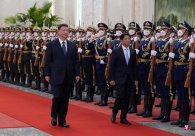South Korea ’s Disease Management (referred to as the Disease Control Department) reported on Thursday (January 5) that as of 5 pm on the same day, nine flights from China to Incheon from China landed.Passengers (including transfer passengers) of the CCP entered the country through Incheon International Airport, a decrease of about 15%from last week.
According to the Yonhap News Agency, specifically, on December 29 last year, the number of reservations from China to South Korea was 1364, which was almost the same as this week, but the actual number of entry (1184) was significantly high high (1184) was significantly high.This week.However, it is difficult to determine whether this will be submitted to the influence of negative certification of crown disease testing from China from the 5th.
The Korean epidemic prevention department said that it is difficult to distinguish whether the 319 reservation passengers who have not entered the country on the day were transferred in South Korea or out of negative proof.The test results of the Incheon Airport Coronary Virus Nuclear Nuclear Type Testing Center on the short -term residency in South Korea on the same day will be released on Friday (6th).
South Korea has requested that from Monday (2nd) from mainland China to receive nucleic acid testing after arriving in South Korea. In the past three days, a total of 917 short -term stays in foreigners were tested at the airport, of which 239 were diagnosed.Rate 26.1%.The single -day positive detection rate announced on the 5th was as high as 31.5%(103 of 327 people confirmed).
In view of the inbound personnel from China, it is necessary to submit negative certificates of coronary detection before entry, and there are observations that cases that have been diagnosed after South Korea may decrease.
According to the statistics of the Korean Centers for Disease Management on the 5th, the positive rate of crown detection of crown tests the day before the admission passengers rose to 31.5%.
1924 immigrants from China flew to Incheon International Airport on the 4th, of which 327 short -term residents were detected at the airport, and 103 were diagnosed.The positive rate rate from China has risen from 20%on the first day (2nd) to 26%on the first day (2nd), 31.5%on the third day, and a three -day average positive rate of 26.1%.
The results of nucleic acid testing carried out by Chinese personnel and long -term residents of Korean personnel and long -term residents have not been counted.In view of the fact that the admission passengers from China must show the negative proof of nucleic acid before the trip, the positive rate of landing testing is expected to decrease.
The South Korean government announced the latest quarantine measures for self -entry personnel on December 30 last year.
According to new measures, South Korea's diplomatic institutions in China will suspend their short -term visas from January 2 to 31, 2023, except for foreign official duties, necessary business needs and humanitarian reasons.The South Korean government also decided to suspend the flight increase from China.
In terms of entry quarantine, from January 2nd to February 28th, 2023, from China to the country and the short -term stays in Korea must immediately receive nucleic acid detection (PCR testing) immediately after arriving in Korea, and regulateThe place is waiting for the test results.Starting from January 5, 2023, all personnel who take the flight from China to South Korea must submit a nucleic acid detection 48 hours before the trip or the antigen detection negative proof of antigen detection 24 hours before the trip.


